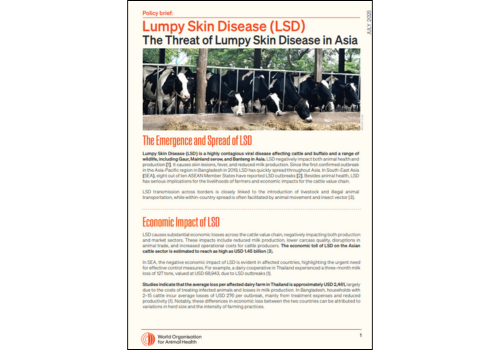Global Framework for the Progressive Control of Transboundary Animal Diseases (GF-TADs)
Lumpy skin disease (LSD) is a poxviral disease with significant morbidity in cattle. Although the mortality rate is generally low, economic losses result from loss of condition, decreased milk production, abortions, infertility and damaged hides. The causative virus seems to be spread mainly by blood-feeding insects, such as certain species of flies and mosquitoes or ticks, and outbreaks can be widespread and difficult to control.
Lumpy skin disease virus (LSDV) is a member of the genus Capripoxvirus and the family Poxviridae. It is closely related antigenically to sheeppox virus and goatpox virus. Although these three viruses are considered to be distinct viral species, they cannot be distinguished by routine serological tests.
There is no evidence that LSDV can infect humans.
LSD was first reported in Asia and the Pacific region in 2019 in north-west China, Bangladesh and India. During the northern summer of 2020, LSD has continued its spread across continental Asia with many members in South and South East Asia confirming outbreaks.
LSD is currently endemic in most of Africa, parts of the Middle East and Turkey. Since 2015, the disease has spread to most of the Balkan countries, the Caucasus and the Russian Federation, where the disease continues to spread, making the risk of an imminent incursion into other unaffected countries very high. Since 2019, several outbreaks of LSD have been reported by Members in Asia (Bangladesh, India, China, Chinese Taipei, Vietnam, Bhutan, Hong Kong (SAR-RPC), Nepal, Sri Lanka, Myanmar, Thailand- as of 02/6/2021).
LSD outbreak information: WAHIS
Lumpy Skin Disease (LSD), traditionally found in Africa and the Middle East, has expanded into Europe and Asia, including widespread outbreaks across South-East Asia since 2020. Recognising the urgent need for regional coordination to manage this transboundary animal disease, ASEAN Member States, WOAH, FAO and partners have collaborated to develop the ASEAN LSD Prevention and Control Strategy 2024–2030. This strategy aligned with global and regional frameworks such as the GF-TADs Strategy and ASEAN’s livestock action plans, aims to guide coordinated efforts to prevent and control LSD in the region. With 8 out of 10 ASEAN countries affected, the strategy provides a structured approach, including a theory of change and an M&E framework, to mitigate LSD’s impact and enhance regional preparedness and response.
Read more
Lumpy Skin Disease (LSD) control in Asia requires a comprehensive and coordinated approach centred on vaccination, surveillance, and international collaboration. Vaccination is recognised as an essential tool, offering clear advantages when supported by effective strategies that ensure access to high-quality vaccines and optimal coverage.
The policy brief highlights:
Download
Communication material for local veterinarians and animal health workers, as developed by the World Organisation for Animal Health (WOAH, founded as OIE).
Communication material for Cattle owners, dairy farmers and dairy animal traders.
Frequently Asked Questions (FAQ) on LSD for the public and veterinary services.


